LATEST NEWS


Growing up, I saw Leimert Park as our version of Harlem: the center of commerce, music and culture for the African-American community in Los Angeles. The last time I was in Leimert Park, I saw shuttered storefronts and empty sidewalks — a stark difference from the hustle and bustle I knew from growing up not far from there. I am sure that it is even more of a shock for the generations of Crenshaw residents before me.
We now have an opportunity to revitalize this once economically thriving community, though, via the Crenshaw/LAX Line, a $1.8 billion light-rail project expected to start construction in early 2014. There is a catch – a Leimert Park station, which would be the crown jewel of the line, is startlingly missing from current plans. There needs to be a Leimert Park station.
Last May, community residents and advocates packed the Metro board room in hopes of hearing good news about the inclusion of their community in the proposed stations.


Today the Dow Jones Industrial Average rose above 14,270 – completely erasing its 54 percent loss between 2007 and 2009.
The stock market is basically back to where it was in 2000, while corporate earnings have doubled since then.
Yet the real median wage is now eight percent below what it was in 2000, and unemployment remains sky-high.
Why is the stock market doing so well, while most Americans are doing so poorly? Four reasons:
First, productivity gains. Corporations have been investing in technology rather than their workers. They get tax credits and deductions for such investments; they get no such tax benefits for improving the skills of their employees. As a result, corporations can now do more with fewer people on their payrolls. That means higher profits.
Second, high unemployment itself. Joblessness all but eliminates the bargaining power of most workers – allowing corporations to keep wages low.
» Read more about: Wall Street: Bull Market for Stocks, Bear Cave for Workers »


Last week, we reported on the legal struggle at port trucking company Seacon Logix, whose drivers filed claims with the California Division of Labor Standards Enforcement (DLSE) seeking reimbursement for a number of wage-and- hour violations, including illegal paycheck deductions made by the company. After the DLSE ruled in favor of the drivers in early 2012 – finding that the drivers were not independent contractors, but were actually misclassified employees – the company appealed the ruling.
On Thursday, a California Superior Court judge ruled in favor of the drivers in every respect, coming to the same conclusions as the DLSE. The court found that drivers were misclassified and ordered the company to pay the four drivers $107,802. Five additional drivers at the same company have similar claims pending.
This is the first in an anticipated wave of rulings addressing conditions for misclassified port truck drivers.
» Read more about: Court: Seacon Logix Port Truck Drivers Are Misclassified »


In societies across the globe, men demonstrate their manhood in different ways. There are many wonderful tracts on the topic. However, in the culture of Washington DC, the best way to demonstrate your manhood is to express your willingness to cut Medicare and Social Security. There is no better way to be admitted into the club of the Very Serious People.
This is the reason that we saw White House spokesman Jay Carney tell a press conference. He told the reporters that President Obama is still willing to cut Social Security benefits by using the chained Consumer Price Index as the basis for the annual cost of living adjustment (COLA). This willingness to cut the benefits of retirees establishes President Obama as a serious person in elite Washington circles.
While most of the DC insiders probably don’t understand the chained CPI, everyone else should recognize that this technical fix amounts to a serious cut in benefits.
» Read more about: Why the Chained Consumer Price Index Threatens Our Elderly »
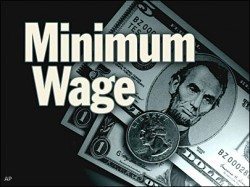
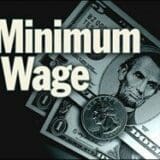
When President Obama proposed an increase in the federal minimum wage last month, you could almost hear conservative economists and pundits smacking their lips in anticipation. After all, there’s nothing that gets this crowd going like mandating a wage increase, even if it’s from the downright Dickensian $7.25 currently required, to a still paltry $9 — or just under $19,000 a year.
Minimum wage foes almost always base their opposition on the supposed damage that these laws do to the businesses that have to pay them and the workers who receive them. Despite reams of research to the contrary, they persist in claiming that minimum wage increases force businesses to lay off workers, hurting the very people who should benefit.
There is another argument, however, against minimum wage laws, one that was trotted out in a column by Slate’s Matt Yglesias. The real problem with these laws is not that they hurt workers and their employers,
» Read more about: The Right to Be Poor: Matt Yglesias’ View of Minimum Wage Laws »
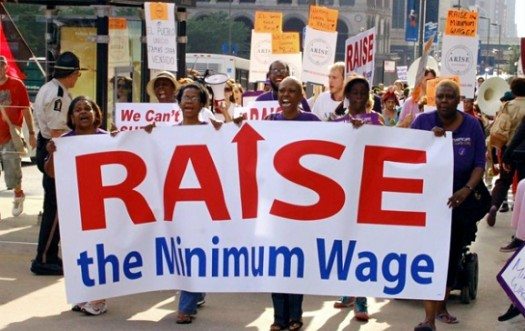
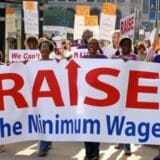
Sustainable economies are built on good jobs. If people don’t earn enough money, they can’t keep the economy growing by buying goods and services.
This basic fact is lost on opponents of minimum-wage increases, who for decades have been arguing that these pay hikes hurt businesses, cause job loss and therefore are bad for the economy.
Repetition of an argument might keep it in the news, but it doesn’t make it factually credible. So it is with minimum-wage rejectionists, who have succeeded in getting at least equal time for their assertions with every proposed wage increase, even though their claims have been debunked over and over again.
It is no surprise, then, that the Reason Foundation’s Adam Summers in his op-ed in the Business Journal predicts dire consequences if California were to increase its minimum wage law (“Higher Minimum Wage Will Lower Job Prospects,” February 11).
» Read more about: Raising the Minimum Wage Will Lift the Economy »


If you watched any one of the recent Los Angeles mayoral debates, you likely concluded that the biggest issue in this election is who voters can trust to get the city’s fiscal house in order.
But what does it really mean to be a good fiscal watchdog in the city of Los Angeles? As a long-time city commissioner and community leader, I have found that the biggest demonstration of strong leadership is the willingness to stand up to the powerful corporate interests and their lobbyists, who continue to dominate most of the decisions made at City Hall.
In 2012, “clients” spent more than $35 million on lobbyists hired to influence City Hall decision-makers. For-profit corporations accounted for more than $31 million of that. Unions spent less than $700,000 on paid lobbyists. The list of companies paying lobbyists to represent their interests at City Hall is a Who’s Who of corporate America.
» Read more about: Our Next Mayor Must Stand Up to Corporate Lobbyists »
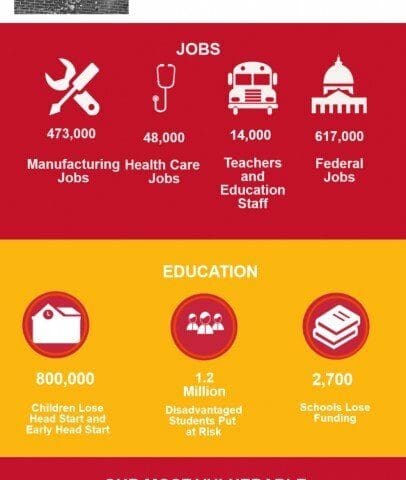
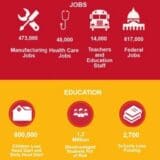
(This article, which first appeared on Equal Voice, includes information from Equal Voice News reporter Kathy Mulady and Associated Press writers Nedra Pickler, Jim Kuhnhenn and Stephen Ohlemacher. Please see Equal Voice’s infographic at the end of this post. Republished with permission.)
Unless sequestration is stopped by an act of Congress, the budget cutting will [contine], reducing funding to thousands of programs that took years to build, and provide a safety net for millions of poor working families.
Under the plan, every dollar approved each year by Congress [will] be slashed by a uniform amount, resulting in at least temporary layoffs for hundreds of thousands of public and private-sector workers. Programs like Medicare and Social Security are exempt, but the slashing of other programs will slow the nation’s fragile economic recovery.
On March 1 automatic cuts of $85 billion from a $3.6 trillion budget [began].
» Read more about: The Sequester: Families and Kids Not on Congress’ Agenda »


We present the following guide to show where three front-running mayoral candidates stand on issues affecting jobs and the local economy. Except as noted, all quotes are drawn from our interviews with the candidates. (Jan Perry did not respond to interview requests.) Please note that Frying Pan News does not endorse candidates.
Issue
Eric Garcetti
Wendy Greuel
Kevin James



Quality Jobs
Most important.
Most important.
Jobs are extremely important but depend on a revitalized business sector.
Quote
“The first thing on my agenda is putting this city back to work, making City Hall work for everybody but then also getting jobs back here — good, middle-class, decent-paying jobs with benefits.”
“I will be the jobs tsar. I will be the person in the city that is going to go out and talk to businesses and encourage them to move to the city of Los Angeles and to grow.”
“We have a shockingly high unemployment rate – it’s 50 percent higher than the national average.
» Read more about: Where Mayoral Candidates Stand on Jobs and the Economy »


“In 1933 we reversed the policy of the previous Administration. For the first time since the Depression you had a Congress and an Administration in Washington which had the courage to provide the necessary resources which private interests no longer had or no longer dared to risk.
This cost money. We knew, and you knew, in March, 1933, that it would cost money. We knew, and you knew, that it would cost money for several years to come. The people understood that in 1933. They understood it in 1934, when they gave the Administration a full endorsement of its policy. They knew in 1935, and they know in 1936, that the plan is working.”—FDR, 1936
Eighty years ago this month, at the height of the worst economic crisis in our nation’s history, Franklin D. Roosevelt delivered on his promise to launch a New Deal for the American people.
» Read more about: The Sequester Puts Humanity Last — FDR Put It First »
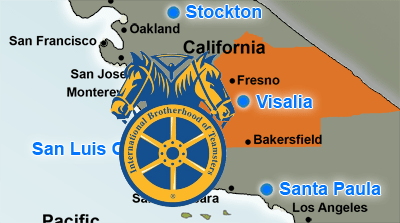
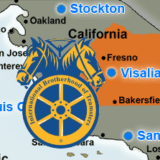
On February 14, 68 employees of VWR in Visalia voted affirmatively to join Teamsters Local 948 in an election supervised by the National Labor Relations Board. The election punctuates a very high profile and controversial move by the company from the Bay Area to Visalia and continues the Teamsters struggle with the company.
VWR, which [distributes laboratory equipment], was founded as a local California company, has grown into a global corporation, reporting more than $4.1 billion in sales for 2011. The Teamsters have represented VWR employees at their distribution center in Brisbane for over 50 years. For most of that time, labor-management relations were good. But when Madison Dearborn, a Chicago-based private equity firm, bought the company in 2007 things quickly changed.
In the midst of contract negotiations in 2010, VWR announced plans to close its Brisbane distribution center and move its operations 220 miles south to a new 500,000 square foot facility in Visalia.
» Read more about: Teamsters Win Election at Runaway Company in Visalia »


Imagine a plot to undermine the government of the United States, to destroy much of its capacity to do the public’s business, and to sow distrust among the population.
Imagine further, that the plotters infiltrate Congress and state governments, reshape their districts to give them disproportionate influence in Washington, and use the media to spread big lies about the government.
Finally, imagine they not only paralyze the government but are on the verge of dismantling pieces of it.
Far-fetched? Perhaps. But take a look at what’s been happening in Washington and many state capitals since Tea Party fanatics gained effective control of the Republican Party, and you’d be forgiven if you see parallels.
Tea Party Republicans are crowing about the “sequestration” cuts beginning today (Friday). “This will be the first significant tea party victory in that we got what we set out to do in changing Washington,” says Rep.
» Read more about: Hostage Crisis: The Sequester and a Tea Party Plot »


A Mediterranean diet, the New England Journal of Medicine reported Monday, can lengthen one’s lifespan. So inhabitants of southern Europe can look forward to long lives — of anxiety and privation.
Already mired in a depression comparable to that of the 1930s, Spain, Greece and Portugal are going to see things grow worse this year, according to an annual economic forecast released by the European Commission on Friday. Unemployment rates in both Spain and Greece — where a quarter of the populations are unemployed and the share of jobless young people exceeds 50 percent — will rise to 27 percent.
At least the leaders in power in 1930 had an excuse when the economy began to collapse. Then, there was genuine bewilderment among economists and governmental chieftains across the political spectrum about how to induce a recovery. From British Laborite Ramsay MacDonald to the German centrist Heinrich Bruning to American conservative Herbert Hoover,
» Read more about: Austerity: Will We Follow Europe’s Lead? »
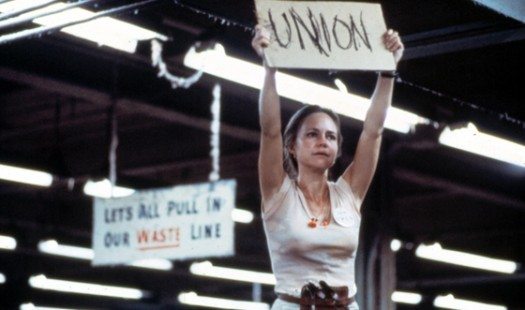
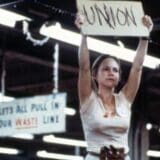
For all the talk of saving and rebuilding the middle class, no public official from the President on down has mentioned the U-word. The U-word? “Unions.” From the 1930s through the ’70s, unions turned working-class jobs into middle-class jobs. Hourly wage earners organized themselves into unions that could fight for livable wages, health and retirement benefits, safety rules, job protection and on-the-job respect. These became such national standards that even in the historically right-to-work states in the Deep South, many of these principles prevailed.
But for three decades those work standards have been under attack, wages have dropped — with benefits cut or stolen. Why is this happening? Because union membership declined as free trade agreements shipped those jobs off-shore, as business mergers stripped workers of health care, and as strategic corporate bankruptcies took away their pension funds. Workers have been asked to “give back” in order to keep their jobs from vanishing,


For years, Los Angeles has been ground zero in an intense debate about how to improve our nation’s education system. What’s less known is who is shaping that debate. Many of the biggest contributors to the so-called “school choice” movement — code words for privatizing our public education system — are billionaires who don’t live in Southern California, but have gained significant influence in local school politics. New York Mayor Michael Bloomberg’s recent contribution of $1 million to a political action committee created to influence next week’s LAUSD school board elections is only the most recent example of the billionaire blitzkrieg.
For more than a decade, however, one of the biggest of the billionaire interlopers has been the Walton family, heirs to the Walmart fortune, who have poured millions into a privatization-oriented, ideological campaign to make L.A. a laboratory for their ideas about treating schools like for-profit businesses,
» Read more about: Walmart Heirs Spend Millions to Privatize L.A. Schools »


Don’t miss this inspiring theatrical adaptation of The Grapes of Wrath, the rabble-rousing, pro-union Depression-era classic that, alas, remains as timely now as the day John Steinbeck wrote it in 1939. With imaginative mise-en-scene, sets, props and an integrated use of live music, A Noise Within’s production brings the Homeric, heroic odyssey of the Joad family from Oklahoma to California vividly, memorably alive.
Forced off of what had been the family farm for generations by a calamity worse than the Dustbowl — greedy bankers — the displaced Joads join the “Okie” trek to California in their decrepit truck (which is assembled onstage like a jalopy jigsaw puzzle that even assembly line maestro Henry Ford would marvel at). The company creatively expresses the Joads’ long march as they go westward ho! on the thrust stage of A Noise Within’s beautiful new space. But once they reach California’s land of milk and honey,
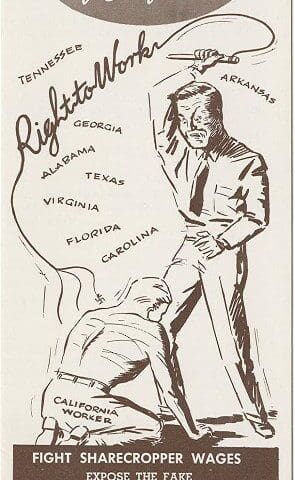
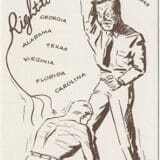
August 28 of this year marks the 50th anniversary of the famous March on Washington. For many people, the march was simply the site where Dr. Martin Luther King delivered his “I Have a Dream” speech. However, the full name of the march was the March on Washington for Jobs and Freedom, and it marked a high point of the modern Civil Rights Movement, after black communities and their supporters throughout the country boycotted buses, sat-in at lunch counters, rode in Freedom Rides, and marched in the streets. These massive protests were aimed at destroying, once and for all, the era of legal segregation — which had been a blot on this country since the end of slavery.
But organizers knew that the end of segregation without good jobs was no freedom at all. So, four of the march’s ten demands focused on employment issues. (See the ten demands and other items in the march’s “Organizing Manual No.


The headlines – “Many States Say ‘No’ to Health Insurance Exchanges,” to take one example – make it seem like bad news. But it’s not. It is good news that half the states are refusing to have anything to do with the new health insurance marketplaces being set up under the Affordable Care Act.
One of the biggest differences between the good version of ObamaCare passed by the House and the mediocre Senate version that became law was the question of whether the federal government or states would run the new health insurance marketplaces (called “exchanges” in the law). But resistance by Republican governors is leading to implementation of the law in a way that is much closer to the vision in the House bill.
The new health marketplaces are the centerpiece of ObamaCare, the mechanisms through which people who don’t get health coverage at work but make too much for Medicaid will be able to purchase subsidized health coverage,
» Read more about: Just Say No to Health Care Marketplaces »


(This post first appeared February 20 on Truthout and is republished with permission.)
Republicans were quick to criticize President Obama last week after he proposed raising the federal minimum wage from $7.25 to $9 during his State of the Union address, but now a poll shows that a majority of voters agree with the president that the current minimum wage is not a living wage and a hike is in order.
A Rasmussen Reports national survey released on Tuesday found that only 15 percent of voters believe the current minimum wage provides workers with enough money to live on, while 72 percent said $7.25 an hour is not a living wage.
Voters remain more closely divided on actually raising the minimum wage, with 54 percent in favor of the raising the minimum wage to $9 an hour and 36 percent opposed to the proposal.


Yesterday we published Part One of a conversation with mayoral hopeful Kevin James, continuing our interviews with Los Angeles’ front-running candidates. James is an entertainment lawyer and talk-show host, who has previously served as a U.S. prosecutor and AIDS Project Los Angeles co-chairman. (The series’ interviews, which have been edited for clarity, include Eric Garcetti, Parts One and Two, and Wendy Greuel, Parts One and Two.)
Frying Pan News: Your campaign’s main selling point is that you are not a City Hall insider, that you have no institutional connection to the city’s budget problems. Other than this, why should Angelenos vote for you?
Kevin James: Neighborhoods across our city believe that this City Council has shut them out, that they don’t have a voice.
» Read more about: Kevin James: Restore City Services and Voter Involvement »